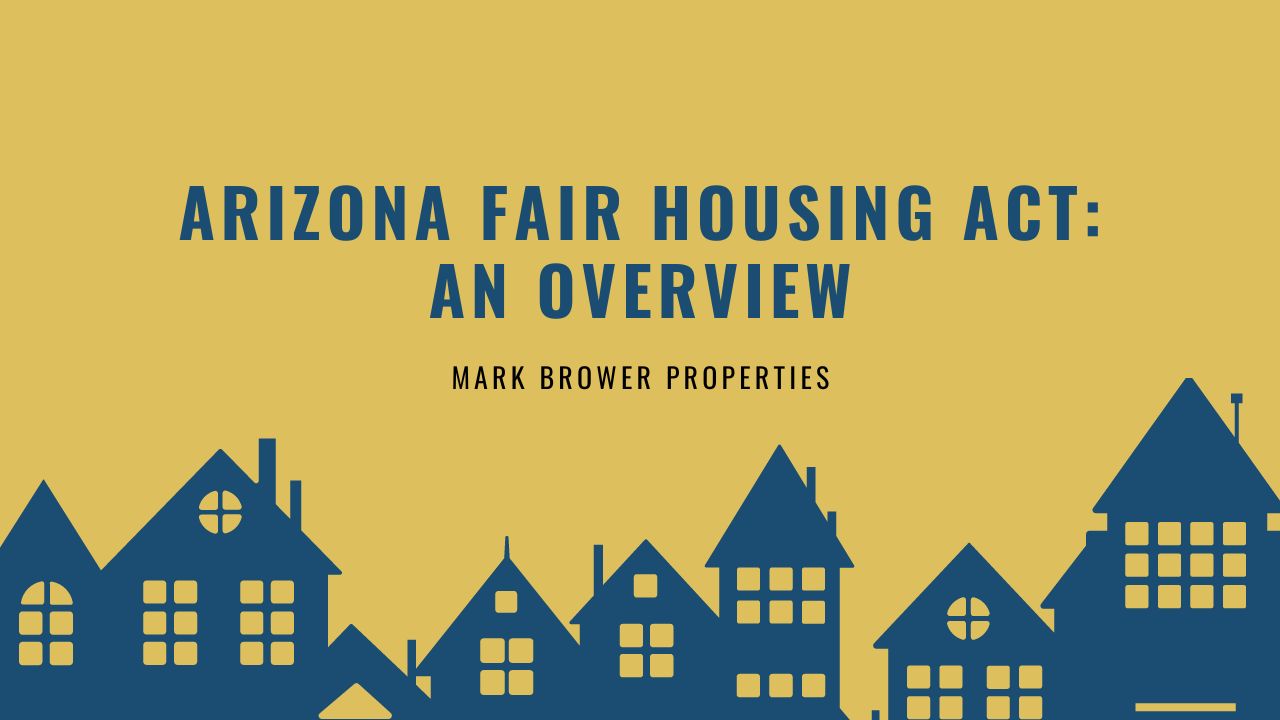The Fair Housing Act (FHA) protects renters from discrimination and understanding its specific elements can assist you in effective property ownership and management. Arizona upholds the right to fair housing through the Fair Housing Act. This federal law prohibits discrimination in housing based on race, color, national origin, religion, sex, disability, and familial status. It applies to renting, buying, and securing financing for housing.
The Arizona Department of Housing (ADH) and the U.S. Department of Housing and Urban Development (HUD) work together to enforce the Fair Housing Act in Arizona. This ensures everyone has an equal opportunity to find a place to live.
This guide will break down the Fair Housing Act in Arizona, explaining what it covers and how it can help you make informed decisions about your rentals.
What Type of Discrimination Does The Fair Housing Act Prohibit?
As a landlord in Arizona, providing fair and equal housing opportunities is required under the landlord-tenant laws. The Fair Housing laws protects individuals from discrimination based on several protected classes. Here’s a detailed explanation of each class to ensure your rental practices are compliant with federal and state laws:
Race and Color
Rejecting someone solely because of their race or skin tone is a clear violation. The Arizona Fair Housing Act prohibits any decisions or treatment of tenants based on race, including ethnicity or national origin that might be perceived through someone’s name.

Gender
The Fair Housing Act ensures individuals, regardless of gender identity or sex, have equal access to housing. This means avoiding language like “suitable for a single man” in advertisements and rejecting applicants based on outdated gender stereotypes about income or responsibility.
National Origin
A qualified applicant from another country deserves the same consideration as a resident. The Fair Housing Act prohibits housing discrimination based on nationality or ancestry. This means avoiding assumptions based on where someone comes from. Setting different security deposits or rental terms based on this protected class is also illegal.
Religion
Respecting a potential tenant’s religious beliefs is essential. Refusing someone because they observe religious holidays differently or require reasonable accommodations is a violation of the Fair Housing Act.
Familial Status
Families with children under 18 are a protected class. To deny housing because a potential tenant has children, imposing age restrictions, or requiring excessive security deposits from families are all violations and illegal under the law. Housing providers need to be aware that the Fair Housing Act also protects pregnant women.
What is Prohibited Under The Fair Housing Act
The Fair Housing Act prohibits housing discrimination based on race, color, sex, disability, national origin, religion, or family status. This means housing providers must avoid actions like:
- Refusing Rentals or Showings: Every qualified applicant deserves a chance, regardless of background.
- Setting Different Terms: Security deposits and rent should be based on qualifications, not protected characteristics.
- Making Misleading Statements: Don’t falsely claim a property is unavailable.
- Discriminatory Advertising: Focus on discussing the features of your rental, not who you want to live there.

- Denying Services or Access: Everyone deserves equal enjoyment of the property and its amenities.
- Steering Tenants: Let qualified applicants choose their living situation.
- Unequal Loan Terms: Financial opportunities shouldn’t be impacted by protected characteristics.
- Refusing Reasonable Accommodations: Work with tenants who need modifications or assistive devices.
- Retaliation: Respecting complaints is key to fostering a positive landlord-tenant relationship.
By understanding the Arizona Fair Housing guidelines, you can create a fair and welcoming environment for potential tenants. This not only upholds the law but also helps you find responsible renters who will appreciate your property.
Renting to Tenants with Disabilities in Arizona
Here are some important things landlords should keep in mind about the Arizona Fair Housing Laws for tenants with disabilities:
Reasonable Modifications
Tenants with disabilities have the right to request reasonable modifications to their units or common areas to make them accessible and livable. This could include installing grab bars, widening doorways, or lowering countertops. The tenant is generally responsible for paying for the modifications themselves. However, you can ask them to restore the unit to its original condition when they move out, but only if it’s reasonable.
Prior Approval Needed
Don’t automatically deny a modification request. Evaluate each request on a case-by-case basis and consider if it’s truly “reasonable.” The modification shouldn’t fundamentally alter the property or create an undue burden on you.

Open Communication
Maintain clear communication with your tenant. Discuss their needs and explore potential solutions together. There may be creative ways to achieve accessibility without extensive modifications.
Service Animals vs. Pets
Service animals are always allowed, even if a landlord has a no-pet policy. Landlords cannot charge a pet deposit or fee for a service animal as this would be illegal under the Fair Housing law. However, landlords can ask for documentation verifying the animal’s service role.
Bottom Line
The Fair Housing laws empower landlords to create a welcoming environment for a wider pool of qualified tenants. By understanding your responsibilities and fostering open communication, you can ensure a smooth rental process for everyone.
Managing rentals can be rewarding, but it also requires time and dedication. If navigating fair housing regulations or tenant communication feels overwhelming, consider partnering with a trusted property management company.
Mark Brower Properties offers comprehensive property management services in Arizona, ensuring legal compliance and taking care of day-to-day tasks. Let us handle the legalities while you focus on the joys of being a landlord. Contact us today and experience the peace of mind that comes with expert property management!
Disclaimer: Please note that the information provided in this blog is intended for general guidance and should not be considered as a replacement for professional legal advice. It is important to be aware that laws pertaining to property management may change, rendering this information outdated by the time you read it.






